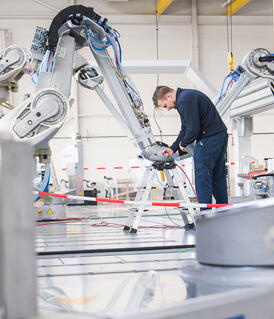German industry’s digital transformation

The economy is going through the fourth industrial revolution. Driven by the Internet, the real and virtual worlds are merging to become an “Internet of Things”. The Federal Government Federal Government The Federal Government and cabinet is made up of the Federal Chancellor and the Federal Ministers. While the Chancellor holds the power to issue directives, the ministers have departmental powers, meaning that they independently run their respective ministries in the framework of those directives… Read more › aims to provide support to business and academia with the development and implementation of “Industry 4.0”, with the aim of positioning Germany as a leading provider of these technologies.
Tailormade production
What makes Industry 4.0 different is how products are highly individualised within production systems and environments that are digital and very flexible. Alongside the “Internet of Things”, technologies such as artificial intelligence , cloud computing and automation play a central role. The fourth industrial revolution has long since begun in many factories: smart monitoring and decision-making processes control and optimise companies and entire value adding networks virtually in real time.
Demand for highly qualified skilled workers
This fundamental transformation of production and work processes requires highly qualified skilled workers who can take responsibility themselves and work semi-autonomously. Germany’s unique dual vocational training Vocational training Dual vocational training is quite unique internationally. After leaving school, many young people follow one of more than 300 state-recognised apprenticeship training programmes under the dual system. This entry into professional life differs from vocational training based only in colleges such as… Read more › system, coupled with a consistent further training strategy in businesses, provide the basis for this.
Germany is Europe’s innovation engine
Germany is considered the innovation champion of Europe. In 2024, German companies submitted more than 25,000 patent applications to the European Patent Office (EPO) in Munich, putting them in first place in Europe and second place worldwide.
An overview of the most important innovation drivers
In 2024, the following fields of technology were in the top five in Germany:
- transport (mechanical engineering sector): 11,153 patent applications
- electric machines and devices, electric energy (electrical engineering sector): 8,248 patent applications
- measurement technology (instruments sector): 4,712 patent applications
- machine elements (mechanical engineering sector): 3,411 patent applications
- computer technology (electrical engineering sector): 3,311 patent applications
Spending 88.7 billion euros, German companies accounted for more than two thirds of total expenditure on research and development in 2023 – thus increasing their investment volume by 8 percent compared to 2022.
Research projects such as quantum computing, particle physics or climate simulations are so complex and expensive that they can only be pursued by alliances of many countries. Joint projects pool expertise, resources and funding.CERN in Geneva (Switzerland) is one of the best-known examples of top-class international research in particle physics. Scientists from 85 nations are working on answering the fundamental questions of the universe there. Another future-oriented project is JUPITER, Europe’s first exascale computer (capable of a trillion calculations per second). It was presented at Forschungszentrum Jülich in 2025. One of the most powerful computers in the world, JUPITER is a key project when it comes to digital advances in Germany and Europe.
Automotive sector remains patent leader
In 2024, nearly 59,300 inventions were registered at the German Patent and Trade Mark Office (DPMA), around 40,000 of which originated in Germany. Automotive supplier Bosch was the most active, submitting nearly 4,500 applications, followed by the carmakers BMW (2,297) and Mercedes-Benz (2,138). Exactly 153,654 German patents were in force in 2024.


